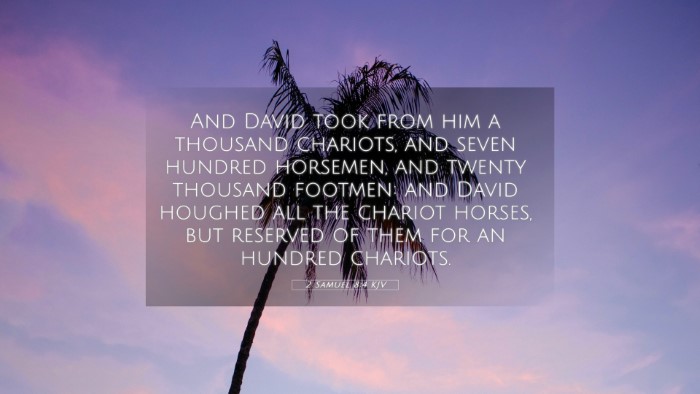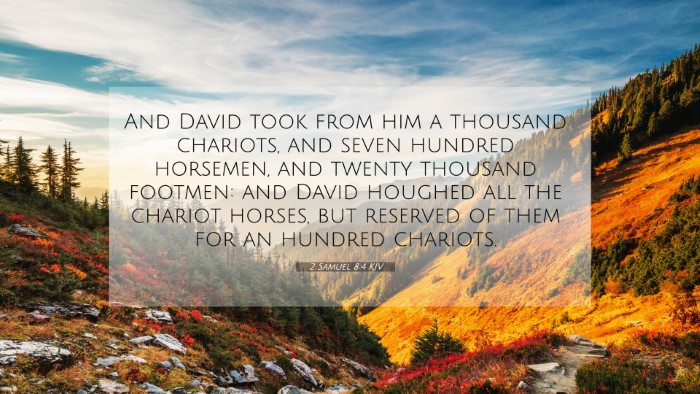Old Testament
Genesis Exodus Leviticus Numbers Deuteronomy Joshua Judges Ruth 1 Samuel 2 Samuel 1 Kings 2 Kings 1 Chronicles 2 Chronicles Ezra Nehemiah Esther Job Psalms Proverbs Ecclesiastes Song of Solomon Isaiah Jeremiah Lamentations Ezekiel Daniel Hosea Joel Amos Obadiah Jonah Micah Nahum Habakkuk Zephaniah Haggai Zechariah Malachi2 Samuel 8:4 Similar Verses
2 Samuel 8:4 Cross References
And David took from him a thousand chariots, and seven hundred horsemen, and twenty thousand footmen: and David houghed all the chariot horses, but reserved of them for an hundred chariots.
Uncover the Rich Themes and Topics of This Bible Verse
Listed below are the Bible themes associated with 2 Samuel 8:4. We invite you to explore each theme to gain deeper insights into the Scriptures.
2 Samuel 8:4 Cross Reference Verses
This section features a detailed cross-reference designed to enrich your understanding of the Scriptures. Below, you will find carefully selected verses that echo the themes and teachings related to 2 Samuel 8:4 KJV. Click on any image to explore detailed analyses of related Bible verses and uncover deeper theological insights.

Joshua 11:6 (KJV) »
And the LORD said unto Joshua, Be not afraid because of them: for to morrow about this time will I deliver them up all slain before Israel: thou shalt hough their horses, and burn their chariots with fire.
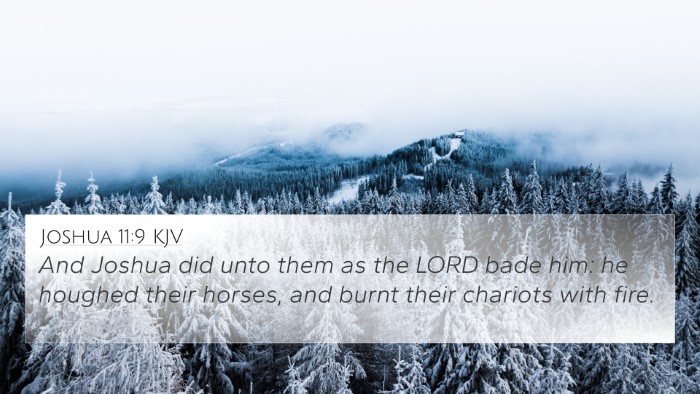
Joshua 11:9 (KJV) »
And Joshua did unto them as the LORD bade him: he houghed their horses, and burnt their chariots with fire.
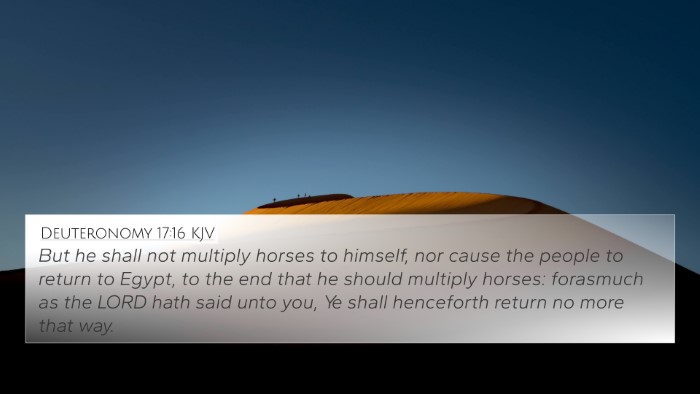
Deuteronomy 17:16 (KJV) »
But he shall not multiply horses to himself, nor cause the people to return to Egypt, to the end that he should multiply horses: forasmuch as the LORD hath said unto you, Ye shall henceforth return no more that way.
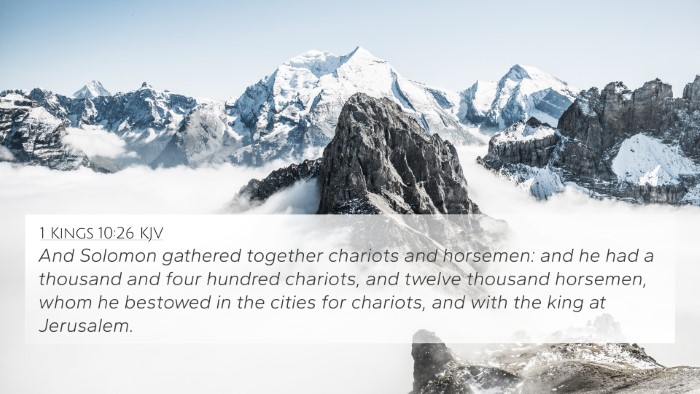
1 Kings 10:26 (KJV) »
And Solomon gathered together chariots and horsemen: and he had a thousand and four hundred chariots, and twelve thousand horsemen, whom he bestowed in the cities for chariots, and with the king at Jerusalem.
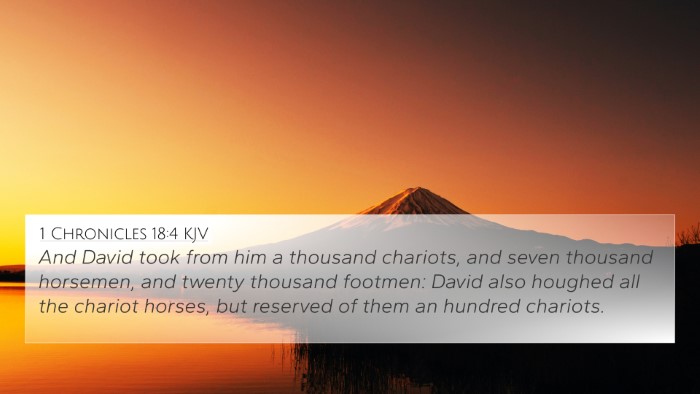
1 Chronicles 18:4 (KJV) »
And David took from him a thousand chariots, and seven thousand horsemen, and twenty thousand footmen: David also houghed all the chariot horses, but reserved of them an hundred chariots.

Psalms 20:7 (KJV) »
Some trust in chariots, and some in horses: but we will remember the name of the LORD our God.
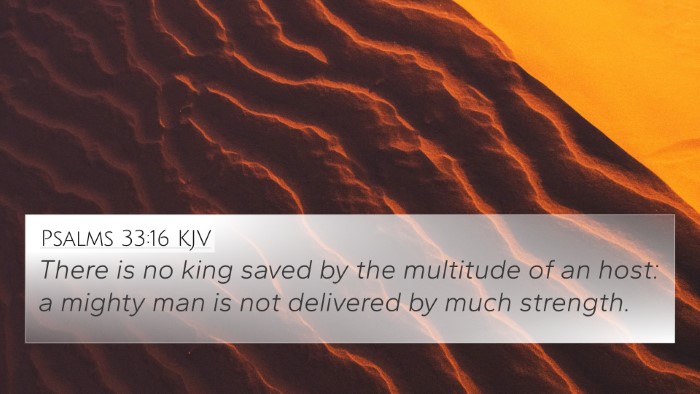
Psalms 33:16 (KJV) »
There is no king saved by the multitude of an host: a mighty man is not delivered by much strength.
2 Samuel 8:4 Verse Analysis and Similar Verses
Understanding 2 Samuel 8:4
2 Samuel 8:4 states: "And David took from him a thousand chariots, and seven hundred horsemen, and twenty thousand footmen: and David houghed all the chariot horses, but reserved of them for an hundred chariots." This verse, nestled within the historical narrative of David’s reign, reflects crucial themes of military might, strategy, and God's covenant faithfulness.
Summary of the Verse Meaning
This passage is not just a recounting of military success; it elucidates David’s wisdom in warfare and his reliance on God’s guidance. Upon defeating the enemy, David takes control of various war resources, underscoring the significance of a prepared and well-equipped army.
Insights from Commentators
-
Matthew Henry:
Henry emphasizes the providence of God in David's victories. These feats were not solely due to David’s might but also the fulfillment of God’s promise to Israel. Henry discusses the moral implications of David's actions, such as the selective destruction of warhorses to avoid reliance on military strength over faith in God.
-
Albert Barnes:
Barnes outlines the significance of the numbers mentioned. A thousand chariots and twenty thousand footmen illustrate the enormity of David's military success. He links this event with the broader context of God's covenant with David, noting that such victories affirm God's presence among His people. Furthermore, Barnes points out the strategic benefits of reserving some horses for chariots, hinting at future military campaigns.
-
Adam Clarke:
Clarke presents a detailed examination of the implications of David's actions. He highlights that the act of logically managing resources (i.e., not using all horses) denotes wisdom in leadership. Moreover, Clarke reflects on the theological dimension, suggesting that David's military strategy aligned with God's intentions for Israel, as they were not merely conquerors but divinely intended rulers.
Bible Verse Cross-References
To deepen the understanding of 2 Samuel 8:4, several related scriptures can further illuminate its meaning:
- 1 Chronicles 18:4: This passage parallels David's military achievements and describes him taking similar resources.
- 2 Samuel 5:20: This verse recounts David's earlier successes against the Philistines, linking his victories and reliance on God.
- Exodus 14:13-14: God's deliverance of Israel from Egypt serves as a reminder that the battle ultimately belongs to the Lord, reiterating faith over military power.
- Psalms 20:7: This psalm contrasts reliance on chariots and horses with trust in the Lord, reinforcing the choice David made in the passage.
- Isaiah 31:1: The warning against seeking help from Egypt echoes the message of dependency on divine support rather than human military might.
- Deuteronomy 17:16: This instruction regarding kings not multiplying horses connects to David's actions and God’s commands for Israel’s rulers.
- 1 Samuel 17:47: David’s declaration before Goliath shows his reliance on God, which is a consistent theme throughout his leadership.
- Psalm 121:1-2: This psalm celebrates God as the ultimate helper and protector, resonating with David's military undertakings.
- Romans 8:31: The rhetorical question "If God be for us, who can be against us?" underscores the essential belief that success is rooted in divine favor.
- 1 Corinthians 15:57: Paul’s declaration of victory through Jesus echoes the sentiment of deliverance and triumph over enemies, akin to David's military victories.
Thematic Connections
The themes of military success, reliance on God, and wisdom in leadership span not just the narrative of David but echo throughout the entirety of Scripture. For instance:
-
Military Strategy and Leadership: The narratives in the Old Testament often highlight divine guidance in battles, showing how leaders like David and others sought counsel from God.
-
God’s Covenant with Israel: David's reign is depicted as a crucial period in God's promise to bless Israel, emphasizing the relationship between faithfulness and divine favor.
-
Trusting in the Lord: Continuous references throughout the Psalms and the Prophets emphasize the necessity of trusting God over one’s own strength.
Cross-Referencing Biblical Texts
Studying and cross-referencing passages like 2 Samuel 8:4 with parallel scriptures allows for a comprehensive understanding of biblical themes. Tools for Bible cross-referencing, such as concordances and reference guides, facilitate this exploration, enabling readers to identify connections and deepen their insights into the text.
Conclusion
2 Samuel 8:4 is more than a simple military record; it encapsulates profound spiritual truths about God's sovereignty, the importance of faith over might, and the strategic nature of leadership under divine guidance. By analyzing this verse through cross-references and thematic studies, scholars and laypeople alike can gain a richer understanding of the interconnectedness of Scripture.

